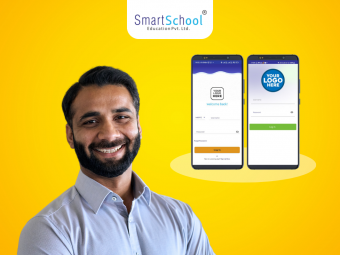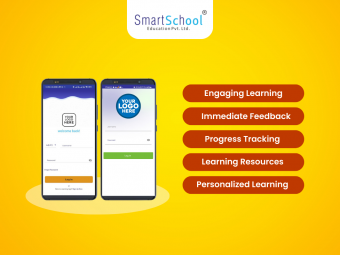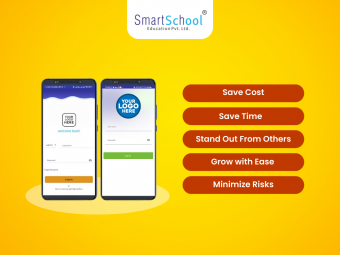The realm of education has witnessed a profound transformation with the advent of educational technology, commonly known as EdTech. EdTech apps have revolutionised the way we learn, making education more accessible, interactive, and personalised. These applications have become indispensable tools for students, educators, and institutions worldwide.
Top 10 Features Of EdTech App
In this blog, we will explore the must-have features of an Edtech app that are instrumental in enhancing the learning experience and driving educational innovation. These elements, when incorporated effectively, can enhance the learning experience and make your app stand out from the competition.
1. User-Friendly Interface:
One of the key aspects of an effective EdTech app is a user-friendly interface. A well-designed interface ensures that students, educators, and even parents can navigate the app effortlessly. Intuitive and easy-to-use features enable users to focus on learning rather than struggling with the app's functionalities. Clear menus, organized content, and a visually appealing design contribute to a seamless user experience.
2. Comprehensive Content Library:
A robust EdTech app should offer a comprehensive content library that covers a wide range of subjects, topics, and learning levels. Whether it's academic courses, skill development modules, or exam preparation materials, the app should provide a diverse collection of educational resources. These resources can include text-based lessons, videos, interactive quizzes, and engaging multimedia content to cater to different learning styles and preferences.
3. Adaptive Learning and Personalization:
Adaptive learning is a crucial feature that tailors the learning experience to each individual's needs and abilities. By utilizing data analytics and algorithms, an EdTech app can track user progress, identify knowledge gaps, and provide personalized recommendations and feedback. Adaptive learning ensures that students receive targeted content and support, allowing them to learn at their own pace and maximize their potential.
4. Collaboration and Communication Tools:
Effective collaboration and communication are essential for a productive learning environment. An EdTech app should incorporate tools that enable students and educators to interact, share ideas, and collaborate on projects. Features like discussion boards, chat functionalities, and video conferencing capabilities foster peer-to-peer learning, encourage teamwork, and facilitate seamless communication between students and teachers.
5. Assessment and Progress Tracking:
Assessment and progress tracking features play a vital role in monitoring student performance and providing feedback. An EdTech app should include various assessment methods, such as quizzes, assignments, and exams, to evaluate student understanding and progress. The app should also provide detailed analytics and progress reports to help educators identify areas for improvement and tailor their teaching strategies accordingly.
Efficient assessment and feedback mechanisms are essential for evaluating student performance. Offer various types of assessments, such as quizzes, assignments, and exams, with instant feedback. Additionally, allow educators to provide personalized feedback to students, helping them understand their strengths and areas for improvement.
6. Gamification and Rewards:
Gamification elements can significantly enhance student engagement and motivation within an EdTech app. By incorporating game-like features such as badges, levels, leaderboards, and virtual rewards, the app creates a sense of achievement and encourages students to actively participate in their learning journey. Gamification also promotes healthy competition, peer collaboration, and a fun learning atmosphere.
7. Collaboration and Communication Tools:
Edtech apps can foster collaboration and communication for K-12 students by incorporating features such as virtual classrooms, interactive discussion boards, real-time messaging, and group project functionalities. These tools enable students to engage in meaningful discussions, exchange ideas, work together on assignments, and receive immediate feedback, fostering a collaborative and interactive learning environment.
Additionally, features like video conferencing, screen sharing, and file sharing facilitate seamless communication and resource sharing, enhancing student engagement and promoting a sense of community within the educational setting.
8. Offline Access and Synchronization:
In areas with limited internet connectivity, offline access to content becomes crucial. Ensure your EdTech app allows users to download resources for offline use. When users regain internet connectivity, the app should automatically sync their progress and data.
9. Cross-Platform Compatibility:
To reach a wider audience, make your EdTech app compatible with multiple platforms and devices, including smartphones, tablets, and desktops. Offering a seamless experience across different devices enhances accessibility and convenience for learners.
10. Data Privacy and Security:
Given the sensitive nature of educational data, prioritize data privacy and security. Implement robust security measures, encryption protocols, and user authentication mechanisms to safeguard user information. Comply with relevant data protection regulations to instill trust in your users.
As the field of EdTech continues to evolve, it is essential to embrace these must-have features and harness the power of technology to shape the future of education, preparing students for a knowledge-driven world.
Why should edtech companies opt for a white label edtech app instead of developing one from scratch?
Edtech companies can choose a white label solution offered by third-party providers. These solutions are pre-built, customizable apps that can be branded and tailored to meet specific requirements. This allows companies to save time and resources by leveraging existing technology. There are several compelling reasons why this approach is advantageous:
1. Time and Cost Efficiency:
Developing an EdTech app from scratch can be a lengthy and expensive process. It requires hiring a development team, investing in infrastructure, and managing the entire development lifecycle. In contrast, a white label EdTech app provides a ready-made solution that can be customized and branded according to the company's needs. This significantly reduces development time and costs, allowing companies to bring their app to market quickly and cost-effectively.
2. Established and Proven Solution:
White label EdTech apps are typically developed by experienced providers who specialize in creating robust and feature-rich educational platforms. These solutions have undergone rigorous testing and optimization, ensuring a reliable and high-quality user experience. By choosing a white label app, companies can leverage the expertise and track record of established providers, offering a proven solution to their users.
3. Customization and Branding:
White label EdTech apps offer a high degree of customization and branding options. Companies can tailor the app's design, features, and functionalities to align with their brand identity and target audience. This flexibility allows for a personalized and unique user experience, while still benefiting from the core features and functionalities provided by the white label solution.
4. Time-to-Market Advantage:
In the fast-paced EdTech industry, time-to-market is crucial. By opting for a white label solution, companies can significantly reduce the time required to launch their app. Since the core app infrastructure is already developed, companies can focus on customizing and branding the app, accelerating the go-to-market process. This allows companies to quickly establish their presence, gain a competitive edge, and start serving their target audience without delays.
5. Ongoing Support and Updates:
White label EdTech app providers typically offer ongoing technical support and regular updates. This ensures that the app remains up-to-date with the latest features, security enhancements, and industry trends. Companies can benefit from the provider's expertise and resources, freeing up internal resources to focus on other critical aspects of their business.
6. Scalability and Flexibility:
White label EdTech apps often come with scalable infrastructure that can handle increasing user demands and accommodate future growth. Providers have already invested in building a scalable platform, eliminating the need for companies to worry about infrastructure scalability. Additionally, white label apps can be easily customized and expanded with new features and functionalities as the company's needs evolve.
Get Your Own Edtech App With Interactive Features SmartSchool’s Whitelabel Edtech App Solution
Get an interactive learning app along with digital content from nursery to class 12th and a powerful teaching app, all white labelled in your own institute’s brand name.
Features Of SmartSchool’s Whitelabel Edtech App Solution
- 50k+ HD Videos - Animated and Anchor Based Videos
- 2 Million+ Learning Resources
- Huge Question Bank Of 1,00,000+ Questions
- 3,000+ Publishers Mapped For Personalized Learning
- 10,000+ Interactive Tools For Revision
- CBSE, ICSE and All Major Indian State Boards
- Bilingual Content - Both In Hindi and English
- Real-Time Tracking of Student Performance
- Monitor Progress and Content Usage Report
- Special Learning Zone for Dyslexia Students
- Real Life Videos and Science Experiments
- Easily Switch Between Offline and Online Content Mode
- Diagrams, Mapwork, History Timelines & Toppers Answers
- HOTs, Previous Year Question Papers & Formulae Master
- Change video speed, Search content and bookmark favourite videos
- Live classes, Fee Tracking, Assignments and Attendance
- WhatsApp, App notifications and Email platform
In conclusion, choosing a white label EdTech app offers numerous advantages over building an app from scratch. It provides a cost-effective, time-efficient, and reliable solution that allows companies to leverage the expertise of established providers, accelerate time-to-market, customize the app to their brand, and benefit from ongoing support and updates. This approach enables EdTech companies to focus on their core competencies and deliver a high-quality educational experience to their users.




Leave your comment